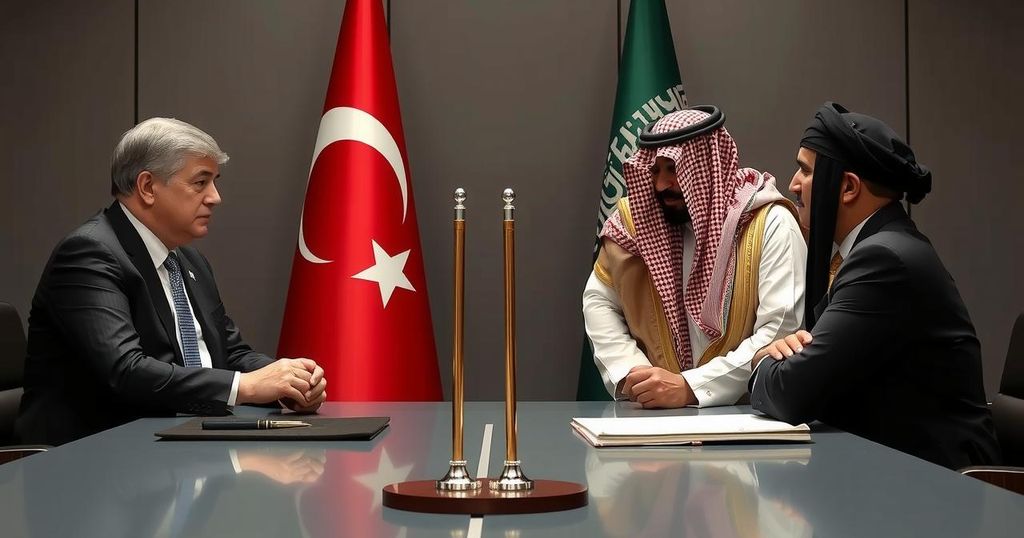Turkey is seeking support from Saudi Arabia and the UAE to influence the reconstruction of Syria following the fall of Assad’s regime. Cautious of repeating past mistakes, Turkish officials aim to stabilize the region through collaboration with Gulf and Western allies while managing the implications of Iran and Russia’s involvement. Significant diplomatic efforts are underway to form a neutral government that secures the rights of women and minorities in Syria.
Turkey is actively pursuing the support of Saudi Arabia and the United Arab Emirates (UAE) to play a pivotal role in shaping Syria’s future. The swift downfall of Bashar al-Assad’s regime has positioned Turkey as a crucial participant in the reconstruction of the war-torn nation. However, Turkish officials are cautious, reflecting on past mistakes made during the Arab Spring, and recognize the necessity of support from both regional allies and Western powers to stabilize Syria, which has a population of approximately 20 million.
President Recep Tayyip Erdogan is keen to engage Gulf nations that have historically been hesitant to align with Islamist movements, particularly those affiliated with the Muslim Brotherhood. A government source noted that “the president believes the concerns raised by Saudi Arabia and particularly the United Arab Emirates should be heard, and their advice valued in Syria.”
Erdogan is scheduled to attend a summit in Cairo with Egyptian President Abdel Fattah el-Sisi to discuss the formation of a new Syrian government. El-Sisi has expressed apprehensions regarding the rise of Hay’at Tahrir al-Sham (HTS) in Damascus, a group formerly aligned with al-Qaeda that has gained significant power since the Assad regime’s collapse.
While Turkey has long denied providing direct support to HTS, the nation acknowledges its influence over the group. Turkish Foreign Minister Hakan Fidan recently stated, “No one knows this group better than Turkey,” indicating Turkey’s complex involvement in Syrian affairs. Furthermore, Erdogan has reportedly offered military and logistical support to HTS to assist in stabilizing the region.
The ongoing coordination between Turkey and key global players, including meetings with the Arab Contact Group and the European Union, aims to establish a representative and inclusive government in Syria. Specifically, Turkish officials emphasize the importance of a neutral Syria that does not threaten its neighbors. Fidan articulated, “We do not want Iranian domination in the region, nor do we want Turkish domination.”
Turkey’s diplomatic overtures towards the UAE seem to have influenced Gulf leaders, who have shifted their stance concerning Assad’s re-entry into the Arab League. Furthermore, discussions around a new regional order have emerged, underlining the need for mutual cooperation among Middle Eastern nations.
Funding for Syria’s reconstruction is anticipated from Gulf states and Western powers. European Commission President Ursula von der Leyen recently expressed the EU’s commitment to enhancing humanitarian efforts in Syria, which Turkish officials view as a vital step toward rebuilding the country.
However, Russia’s military presence in Syria looms over reconstruction efforts, with some EU member states insisting on Russia’s withdrawal prior to committing to support the new administration. Negotiations are reportedly underway between Russia and HTS regarding the latter’s potential de-listing from the UN Security Council’s terrorism list, a move that could alleviate tensions and assist in stabilizing Syria.
The situation in Syria remains precarious following the downfall of the Assad regime, which has opened a new chapter in the geopolitical landscape of the Middle East. Regional powers, especially Turkey, are seeking to exert influence over the reconstruction and governance of Syria. Given the historical context of the Arab Spring and subsequent rise of various factions, the need for a stable and non-threatening government in Syria is paramount to all involved parties. Turkey’s relationships with Gulf nations, as well as Western powers, are foundational to these stabilization efforts, as are concerns regarding Iran’s and Russia’s roles in the region.
Turkey’s quest for Saudi Arabia and UAE support signifies its strategic shift in handling the post-Assad landscape in Syria. Engaging regional allies illustrates Turkey’s understanding of the complex dynamics at play and its commitment to creating a neutral and stable government in Syria. The outcomes of these diplomatic initiatives will largely depend on the collaboration among key players including Gulf states and Western powers, alongside the management of ongoing challenges posed by Iran and Russia.
Original Source: www.middleeasteye.net






